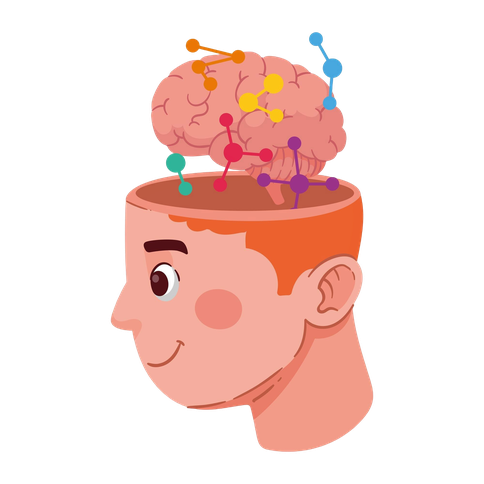The cognitive benefits of learning a new language: how Spanish boosts your mind and memory
Discover how learning Spanish not only improves your language skills but also enhances memory, focus, and mental agility. Dive into the cognitive advantages and learn how to integrate Spanish study into your daily routine to improve your mental well-being and self-esteem.
Learning Spanish: what science says about its benefits for your brain Uncover the scientific theories behind the benefits of language learning. Studies on bilingualism and brain plasticity show how memorizing vocabulary and conjugating Spanish verbs can enhance memory, focus, and prevent cognitive decline. A linguistic journey that doubles as a powerful brain workout!
Improve short- and long-term memory

Learning a new language, like Spanish, isn’t just an opportunity to expand your linguistic skills—it’s a powerful workout for your brain. Every new word, grammatical rule, or idiomatic expression you master requires a memory effort that strengthens both your short- and long-term memory. This learning process doesn’t just benefit your language abilities but also enhances your capacity to recall and apply information in everyday life.
Curious to experience these benefits yourself? With my online Spanish course, Spanish from scratch, you can master the language while simultaneously training your mind. Whether you’re an absolute beginner or looking to refine your skills, my lessons are designed to be effective, engaging, and personalized. Book a session today and start your language journey!
For more information, click here or email info@esp-on.com.
How short-term memory reinforcement works
When studying a language, your brain engages in processing, storing, and retrieving new information quickly. For instance, during a Spanish lesson, you might learn a new set of food-related vocabulary such as pan (bread), queso (cheese), and aceitunas (olives). Trying to recall these terms during a conversation or exercise activates your short-term memory, which manages temporary information.
This regular practice, like repeating vocabulary or using it in simple sentences, stimulates your brain to work more efficiently, improving your ability to retain useful information for other contexts, such as remembering a shopping list or an important appointment.
The role of consistent study in long-term memory
Long-term memory is activated when you repeatedly encounter the same information over time, transferring it from temporary storage to a permanent one. Consistent language practice, like daily reviews of verbs or common phrases, facilitates this transition. For instance, studying Spanish grammar structures, such as the pretérito perfecto (I have eaten) or futuro inmediato (I’m going to eat), requires continuous practice to internalize the rules and apply them naturally.
Over time, this knowledge becomes an integral part of your linguistic repertoire, allowing you to use it effortlessly.
This process not only improves your ability to speak a foreign language but also strengthens your general memory, helping you recall critical details like a phone number or a conversation you had days ago. As Joe Dispenza, a renowned neuroscience expert, explains, every time you engage your brain’s neural networks through repetition and practice, these connections grow stronger and more durable.
The science of memory and neural pathways
Learning a language activates multiple areas of the brain simultaneously: the language center, short- and long-term memory, and even motor functions during writing or pronunciation. This interplay requires neural networks to work together, creating new pathways and reinforcing existing ones. With consistent practice, these pathways become quicker and more efficient, like a road that becomes smoother and easier to travel with frequent use.
Joe Dispenza highlights the brain’s incredible plasticity, its ability to adapt and reshape through repeated experiences. When you learn something new—like a grammatical rule or a set of vocabulary in Spanish—you’re literally “rewiring” your brain. Intentional repetition strengthens these circuits, making them more stable and automatic, benefiting not just your language studies but other daily tasks that demand focus and memory.
This explains why consistent language practice, such as reviewing irregular verbs or perfecting your pronunciation, doesn’t just improve communication but has ripple effects on other cognitive abilities, making your brain more agile and prepared for new challenges.
Personalized lessons to boost memory
During my online Spanish lessons, I help students memorize vocabulary and grammatical structures through targeted techniques, such as interactive exercises and active repetition. Each lesson is an opportunity to strengthen your memory while making tangible progress in the language. If you’re ready to try a tailored approach, explore my Spanish from scratch course or email info@esp-on.com.
Why learning a language is a workout for your brain
Think of your brain as a muscle. Every time you study a language, you’re training it. Just as physical exercise enhances strength and endurance, cognitive exercises like learning new words, practicing pronunciation, and reviewing grammar stimulate your neurons to form stronger connections.
For example, mastering irregular Spanish verbs (ser, estar, tener) and understanding when to use them demands attention and repetition. This type of cognitive workout is especially beneficial for improving working memory—the ability to retain and manipulate information for short periods—a crucial skill in many daily activities.
Broad benefits in daily life
The cognitive advantages of learning a language extend far beyond academics. The ability to recall vocabulary or linguistic structures translates into better overall memory skills. You’ll find it easier to remember names, appointments, or details of a work project.
For instance, a student who has enhanced their memory through Spanish study may notice being quicker at preparing presentations or recalling key points during a meeting. This demonstrates how learning a language can positively impact various aspects of life, making you more efficient and confident.
Boost concentration and multitasking abilities

Learning a language like Spanish is not just a cultural and communicative journey but also a powerful mental workout. The process requires constant attention to details, such as the meaning of words, their correct pronunciation, and the application of grammatical rules. This effort not only enhances your ability to focus on a specific task but also strengthens your multitasking skills. How does this work on a brain level? Let’s dive in.
Concentration: continuous training for the brain
When you immerse yourself in studying Spanish, you are training your brain to focus on a series of complex cognitive tasks. For example, while learning a new word like desafío (challenge), you need to remember its meaning, correct pronunciation, and the context in which to use it. This kind of selective attention strengthens the prefrontal cortex, the part of the brain responsible for focus and cognitive control.
Referencing Joe Dispenza once again, he explains that the brain is like a muscle: the more you consciously engage it, the stronger its neural connections become. Every time you focus on a new grammatical rule or idiomatic expression, you are creating and consolidating neural pathways. This process not only improves your Spanish skills but also enhances your ability to focus on critical tasks in daily life, such as solving complex problems or managing work projects.
The role of multitasking in bilingualism and language learning
Bilingualism and the study of a second language stimulate a critical skill: the ability to switch quickly between linguistic systems. For example, when speaking in Spanish, your brain must temporarily "shut off" the system of your native language and activate the one for the new language. This exercise in linguistic alternation engages various brain areas, including the frontal lobe, which plays a crucial role in multitasking.
Practical applications in daily and professional life
Language learning enhances concentration and multitasking, valuable qualities for everyday and professional scenarios. For a student, this means maintaining focus during long study sessions. For an expat, it translates into managing tasks like attending a meeting in Spanish while responding to messages in another language.
In the workplace, these skills are highly beneficial. For example, a teacher can create personalized teaching materials for different linguistic levels while efficiently managing lessons and grading tasks simultaneously.
Linguistic exercises to train concentration and multitasking
Incorporating cognitive training into your routine is simple. If you’re a student, dedicate 10-15 minutes daily to targeted activities, such as listening exercises on apps like Quizlet or LingQ, focusing on a single aspect, such as a dialogue.
If you’re a teacher, design activities that combine concentration and multitasking, like following an audio conversation in Spanish while taking notes on key words. These exercises not only enhance listening comprehension but also prepare individuals for real-life situations, such as lessons or meetings conducted in Spanish.
Strengthen problem-solving and critical thinking

Learning Spanish is a workout for the mind. Tackling complex grammatical rules or idiomatic expressions stimulates critical thinking and problem-solving skills, enhancing not only your linguistic abilities but also cognitive skills that are valuable in daily life and professional settings.
Tackling daily linguistic "puzzles"
Learning a language is like solving a continuous puzzle, requiring attention, analysis, and creativity. For example, interpreting Spanish idiomatic expressions like echar una mano or choosing between pretérito indefinido and imperfecto fosters flexible thinking and problem-solving. These exercises strengthen neural connections, improving the brain’s ability to handle complex situations.
How to integrate critical thinking into studying Spanish
To enhance your problem-solving skills while learning Spanish, incorporate specific exercises into your routine. For example:
For students: Try translating authentic articles or texts, such as news stories or short narratives, aiming to grasp the overall meaning and decipher any figurative expressions. This practice forces you to interpret context and find linguistic solutions.
For teachers: Introduce creative interpretation exercises, such as asking students to explain the meaning of an idiomatic phrase with practical examples. This approach not only reinforces their understanding but also encourages reflection and class discussions.
Stimulates mental agility and prevents cognitive decline

Learning a new language, like Spanish, is not just a way to enrich your cultural knowledge or enhance your career opportunities; it’s also one of the most effective tools to keep your brain active and prevent cognitive decline. Numerous scientific studies have shown that bilingualism, or even simply learning a second language, positively impacts brain health, improving mental agility and reducing the risk of neurodegenerative diseases such as Alzheimer’s.
A workout for the mind at any age
Learning Spanish challenges your brain with tasks such as memorizing vocabulary, understanding grammar rules, and interpreting idiomatic expressions. This process stimulates brain plasticity—the ability to form new neural connections—keeping the mind young and active at any age.
According to experts like Joe Dispenza, focusing on new tasks, such as conjugating verbs or pronouncing complex words, strengthens these connections. This continuous training makes your brain more efficient, enhancing problem-solving skills and adaptability to new situations.
How language learning delays cognitive decline
The act of learning a language has a remarkable effect on preventing cognitive decline. Neuroscientific studies reveal that bilingualism can delay diseases like Alzheimer’s by 4-5 years, thanks to the continuous management of multiple linguistic systems that keeps the brain active and resilient.
Switching from thinking in Italian to forming a sentence in Spanish, such as ¿Dónde está la estación de tren?, requires your brain to inhibit one system and activate another. This exercise strengthens attention, memory, and executive control—essential functions to counter cognitive deterioration.
Adaptability and flexible thinking
Learning a new language, like Spanish, not only keeps the brain youthful but also reinforces cognitive flexibility—the ability to adapt quickly to new situations and transition smoothly between thoughts or tasks.
It’s an investment for the future: in a world where life expectancy continues to rise, keeping your brain active is essential for maintaining a good quality of life. Mastering Spanish is not just about communication; it’s a conscious choice to preserve mental health and foster continuous growth.
How to start or improve your learning
To maximize the cognitive benefits of studying Spanish, dedicate 10-15 minutes a day to activities like listening, reading, or conversation. Use tools like Quizlet for vocabulary or attend online lessons with experienced teachers.
If you’re a teacher, encourage your students to practice regularly and demonstrate how learning a language enhances not only communication skills but also mental health. Integrate activities into your lessons that stimulate critical thinking and adaptability, such as translations and role-playing exercises.
Boosts self-esteem and enhances overall well-being
Learning a new language, like Spanish, is not just a workout for the brain—it’s a personal journey that can profoundly transform how you perceive yourself and the world around you. As you gain language skills, you not only discover new ways to express yourself but also build growing confidence in your abilities. This process, combined with cognitive benefits, brings about significant improvements in emotional well-being.
Small victories, big self-esteem
Every time you correctly pronounce a phrase in Spanish, understand a dialogue in a film, or successfully order at a restaurant in Spain, you accumulate small personal victories. These moments, simple yet meaningful, strengthen your self-esteem and showcase the value of your effort.
Many of my online students, expats who have moved to Spanish-speaking countries, start with fears and insecurities, often hindered by the fear of making mistakes. Over time, and with personalized lessons, they transform: from hesitant beginners to confident learners capable of communicating naturally. Every step forward becomes a solid foundation for building self-confidence.
Learning as a path to personal growth
Learning Spanish is not just a path to acquiring new skills; it’s a true journey of personal growth. Overcoming the challenges of learning requires patience, resilience, and determination—qualities that positively influence many aspects of daily life.
Science supports this effect. Studies in cognitive psychology show that continuous learning stimulates the release of dopamine, the hormone associated with well-being. Every time you memorize a new word or understand a grammatical rule, you experience satisfaction that fuels your motivation. This virtuous cycle pushes you to learn more, improving not only your language skills but also your overall well-being.
Enhancing general well-being
Learning a language like Spanish is closely linked to overall well-being, combining mental stimulation and emotional serenity. It’s an activity that reduces stress, keeps the mind active, and offers a purposeful focus.
Neuroscientific studies confirm that learning a language can lower cortisol levels, the stress hormone. The combination of mental activity and socialization typical of language study creates an ideal balance, benefiting both brain health and emotional well-being.
Learning Spanish is an investment that goes beyond linguistic skills. It’s a pathway to personal growth, improved self-esteem, and the opportunity to connect with new cultures and people. For both students and teachers, this journey enriches life in meaningful ways, making every word learned a step toward greater personal fulfillment.
Learning a language is not just about communication; it’s an opportunity to train your mind, improve concentration, and enhance critical thinking. If you want to experience all this firsthand, contact me at info@esp-on.com for more information about the course Spanish from Scratch and discover how learning a new language can transform not only your vocabulary but also your way of thinking.